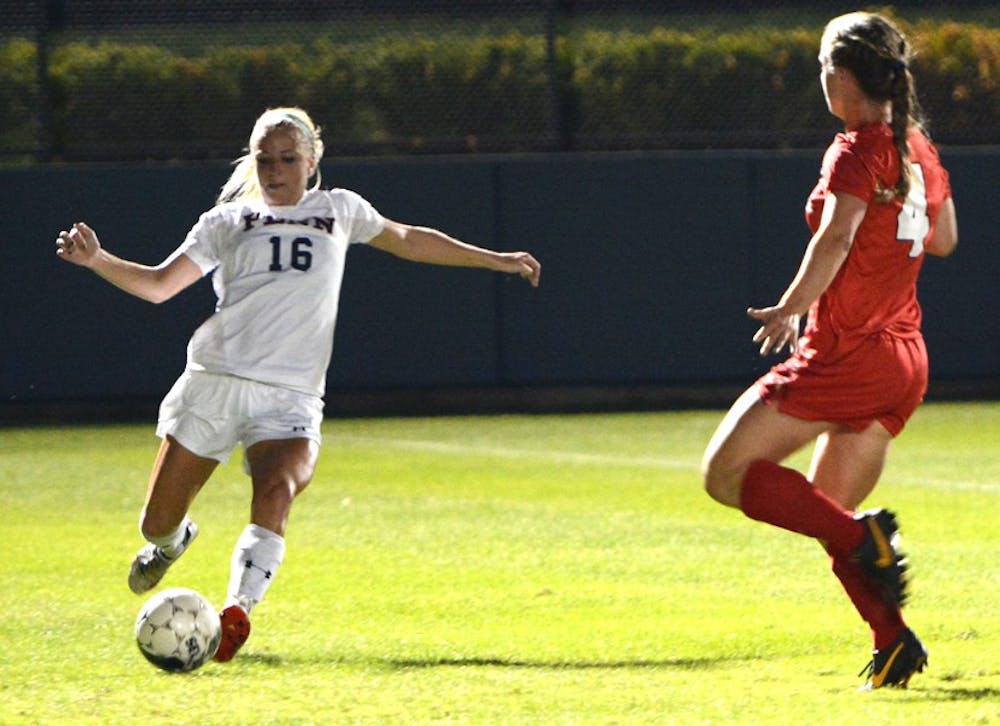
T he notion of a star-studded defense is almost an oxymoron, especially in soccer. Though coaches, players, sports writers and fans pay lip service to the notion that “defense wins championships,” reverence for stars is generally reserved for those whose outstanding individual performances are a bit more, well, quantifiable.
At the end of the day, the box score has no statistic to demonstrate the brilliance of an individual defender’s play, and what isn’t evident in a box score is rarely appreciated by fans — especially American fans, being the stat-hungry consumers they are, not to mention journalists and even some coaches.
Of course, this has never been the case for Penn women’s soccer coach Darren Ambrose, a former goalkeeper who pays much more than lip service to the idea that defense requires a team-wide commitment to defending at every position. Perhaps, then, the fact that Ambrose’s team defies stereotypes when it comes to the offensive-
defensive-stardom dichotomy should come as no surprise. And indeed, this season the Red and Blue will have a couple bona fide stars on the backline and in goal.
To start, the Quakers return junior Caroline Dwyer , the defending (no pun intended) Ivy League Defensive Player of the Year. Her performance last season has earned her a spot on the watch list for the Missouri Athletic Club (MAC) Hermann Trophy, which is annually awarded to the top male and female NCAA soccer players.
Meanwhile, junior keeper Kalijah Terilli received some national recognition of her own this summer with an invitation to the U.S. U-23 National Team camp, an honor given to just four goalies in the country.
If this weren’t enough star power for Penn’s defense, the squad has managed to add further talent to its backline with the transfer of junior Paige Lombard from Miama (Fla.). Lombard recorded nine starts in her sophomore campaign and her ACC experience makes her a welcome addition to the roster.
If there is such a thing as a star-studded defense, the Quakers have one this season. Of course, the key to Ambrose’s system is that defense isn’t about stars, primarily because it isn’t about individuals — again, it’s a team-wide commitment at every position.
Though a couple of Penn defenders have perhaps received more recognition than usual, the Red and Blue will ultimately play great defense because their talent is placed in the context of a defensive-minded, team-oriented culture that makes the whole greater than the sum of the parts. The Quakers have ranked among the top two of Ivy League teams for goals allowed per game for four consecutive seasons. I expect this season to be no different.
The Quakers have done virtually everything except win it all three of those four seasons, narrowly missing championships each year since their last title in 2010. Since Penn’s ambition is to take home an Ivy title, let’s compare the Red and Blue against previous championship winning teams.
In the past four years, the Ivy League title-winning squad has yielded an average of 6.8 goals in conference play. Over that span, Penn has averaged just 5.8 goals against and never conceded more than seven goals in a single Ivy season. In other words, the Quakers have brought a championship quality defense to the table each of these seasons.
However, the same title winning squads have also averaged 17 goals in Ivy League play, while the Red and Blue have recorded an average of just 10.5 scores over that span. The lowest offensive output among these title-winning squads was Penn’s 2010 campaign, which logged 12 goals on its way to a conference championship. By contrast, last year’s team scored nine times in Ivy play.
The good news to be gleaned from this analysis for the Quakers is that they are very likely to be no more than three additional scores away from winning some Ivy hardware at this year’s end. The bad news is that a three-goal increase would represent a 33 percent improvement on last year’s offensive production in conference play, and the Red and Blue would need to do it having graduated last year’s leading scorer, Kerry Scalora .
As strange as it sounds, this team needs a couple of garden variety, goal-scoring offensive powerhouses to reaffirm stereotypes and overshadow its defensive stars. I suspect the likes of Dwyer and Terilli won’t mind the lack of attention — especially when they’re hoisting an Ivy League championship trophy.
The Daily Pennsylvanian is an independent, student-run newspaper. Please consider making a donation to support the coverage that shapes the University. Your generosity ensures a future of strong journalism at Penn.
DonatePlease note All comments are eligible for publication in The Daily Pennsylvanian.




